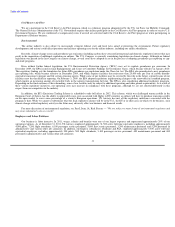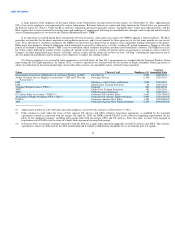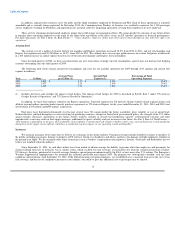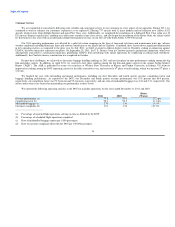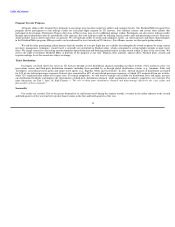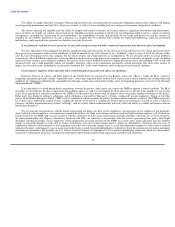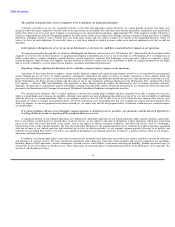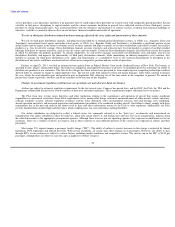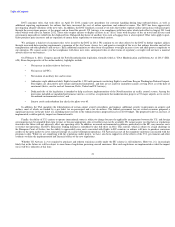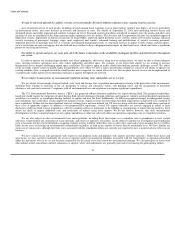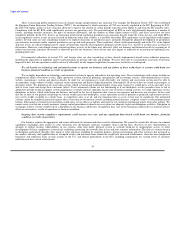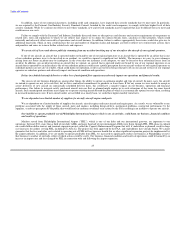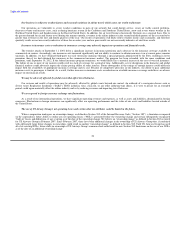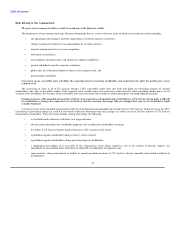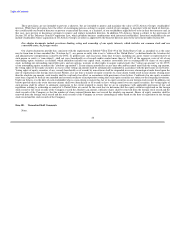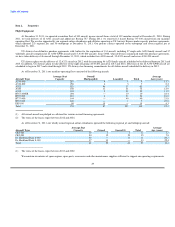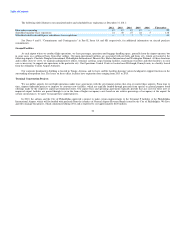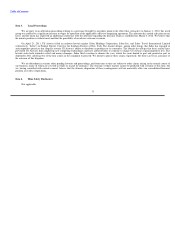US Airways 2011 Annual Report Download - page 24
Download and view the complete annual report
Please find page 24 of the 2011 US Airways annual report below. You can navigate through the pages in the report by either clicking on the pages listed below, or by using the keyword search tool below to find specific information within the annual report.
Table of Contents
DOT consumer rules, that took effect on April 29, 2010, require new procedures for customer handling during long onboard delays, as well as
additional reporting requirements for airlines that have increased the cost of airline operations and reduced revenues. The DOT has been aggressively
investigating alleged violations of the new rules. In addition, the DOT finalized a second set of rules that further regulate airline interactions with passengers
through the reservations process, at the airport and on board the aircraft. US Airways is in compliance with these rules which took effect in August 2011 and
others which took effect in January 2012. These rules require airlines to display all fares in an "all in" basis with the price of the air travel and all taxes and
government imposed fees rolled into the displayed fare. Enhanced disclosure of ancillary fees such as baggage fees is also required. Other rules apply to post-
ticket purchase price increases and an expansion of tarmac delay regulations to international carriers.
We anticipate a third set of consumer rules to be issued by the DOT in 2012. We continue to see other efforts by the DOT to further regulate airlines
through increased data reporting requirements, expansion of the Air Carrier Access Act, and greater oversight of the ways that airlines describe and sell air
transportation and other products and services. Each additional regulation or other form of regulatory oversight increases costs and adds greater complexity to
our operation. We cannot assure you that compliance with these new rules, anticipated rules or other forms of regulatory oversight will not have a material
adverse effect on our business.
On February 6, 2012, Congress passed the FAA Reauthorization legislation, formally titled as "FAA Modernization and Reform Act of 2012" (H.R.
658). From the perspective of the airline industry, highlights include:
• No increase in airline ticket or fuel taxes;
• No increase in PFCs;
• No taxation of ancillary fees and revenue;
• Authorizes eight additional daily flights beyond the 1,250 mile perimeter restricting flights to and from Reagan Washington National Airport.
Four flights are allocated to new entrant and limited incumbents, and four are set aside for incumbent carriers serving DCA as of the date of
enactment (that is, one for each of American, Delta, United and US Airways);
• Dedicated title of the legislation is intended to help accelerate implementation of the NextGeneration air traffic control system. Among the
provisions included are mandated performance metrics, as well as a requirement that modernization projects at 35 major airports are to receive
streamlined environmental review; and
• Sunsets costly and redundant line checks for pilots over 60.
In addition, the TSA mandates the federalization of certain airport security procedures and imposes additional security requirements on airports and
airlines, most of which are funded by a per ticket tax on passengers and a tax on airlines. The federal government has on several occasions proposed a
significant increase in the per ticket tax, including most recently in the Administration's proposed fiscal year 2013 budget. The proposed ticket tax increase, if
implemented, could negatively impact our financial results.
Finally, the ability of U.S. carriers to operate international routes is subject to change because the applicable arrangements between the U.S. and foreign
governments may be amended from time to time, or because appropriate slots or facilities may not be available. We cannot assure you that laws or regulations
enacted in the future will not adversely affect our operating costs. In addition, increased environmental regulation, particularly in the EU, may increase costs
or restrict our operations. The EU's Emissions Trading Scheme is scheduled to take full effect in 2012. This scheme, which is subject to a legal challenge in
the European Court of Justice, has the ability to appreciably raise costs associated with flights to EU countries as airlines will have to purchase emissions
credits on the open market to cover some percentage of a carrier's European operations. US Airways has met all the regulatory milestones associated with the
program to date. While we are complying with the regulations under protest, we have also been supportive of the efforts of the U.S. government and other
countries to delay the implementation and financial effects of the new regulations.
Whether US Airways is ever required to purchase and redeem emissions credits under the EU scheme is still unknown. However, it is increasingly
likely that in the future we will be subject to some form of regulation governing aircraft emissions. How such regulations are implemented or what the impact
on us will be is unknown at this time.
21


